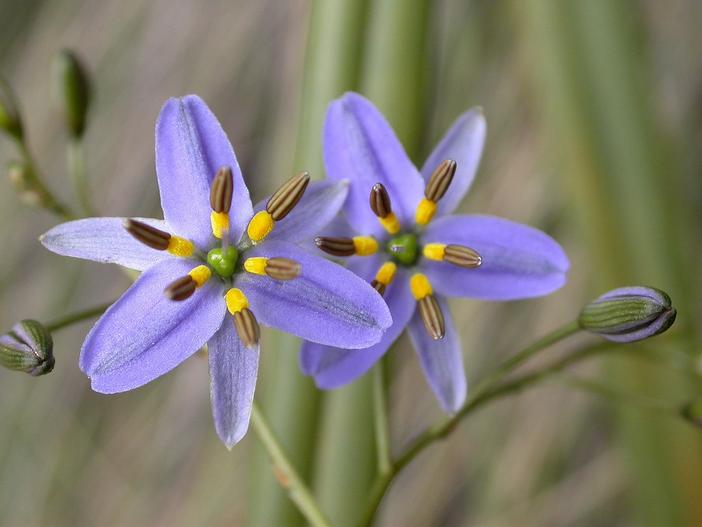Blue Flax-Lily
(Dianella revoluta)
Blue Flax-Lily (Dianella revoluta)
/
/

DavidFrancis34
CC BY-SA 2.0
Image By:
DavidFrancis34
Recorded By:
Copyright:
CC BY-SA 2.0
Copyright Notice:
Photo by: DavidFrancis34 | License Type: CC BY-SA 2.0 | License URL: https://creativecommons.org/licenses/by-sa/2.0/ | Uploader: DavidFrancis34 | Publisher: Flickr







































































































Estimated Native Range
Summary
Dianella revoluta, commonly known as Blue Flax-Lily, is an evergreen perennial herb native to a variety of habitats in Australia, including open woodlands, coastal heaths, and dry sclerophyll forests. It typically grows to a height of 2-4 feet and a width of 2-3 feet. The Blue Flax-Lily is characterized by its tufted habit with strappy, grass-like leaves and clusters of striking blue or violet flowers. Each flower consists of six tepals, with stamens featuring bright yellow filaments and contrasting pale brown to almost black anthers. Flowering mainly occurs from spring to early summer, and the plant produces attractive blue to purple berries that are 4–10 mm (0.16–0.39 in) long.
The Blue Flax-Lily is valued for its drought tolerance and low maintenance requirements, making it a suitable choice for water-wise gardens. Its vibrant flowers and colorful berries add ornamental interest, and it is often used in mass plantings, as a border specimen, or in containers. It thrives in full sun to part shade and prefers soils with good drainage, although it can adapt to a range of soil conditions. While generally pest-free, it can occasionally suffer from scale insects or rust. The Blue Flax-Lily is also known for its ability to withstand coastal conditions, making it a good choice for seaside gardens.CC BY-SA 4.0
The Blue Flax-Lily is valued for its drought tolerance and low maintenance requirements, making it a suitable choice for water-wise gardens. Its vibrant flowers and colorful berries add ornamental interest, and it is often used in mass plantings, as a border specimen, or in containers. It thrives in full sun to part shade and prefers soils with good drainage, although it can adapt to a range of soil conditions. While generally pest-free, it can occasionally suffer from scale insects or rust. The Blue Flax-Lily is also known for its ability to withstand coastal conditions, making it a good choice for seaside gardens.CC BY-SA 4.0
Plant Description
- Plant Type: Herb
- Height: 2-4 feet
- Width: 2-3 feet
- Growth Rate: Moderate
- Flower Color: Purple
- Flowering Season: Spring
- Leaf Retention: Evergreen
Growth Requirements
- Sun: Full Sun, Part Shade
- Water: Medium
- Drainage: Medium
Common Uses
Bee Garden, Bird Garden, Border Plant, Butterfly Garden, Deer Resistant, Drought Tolerant, Edible*Disclaimer: Easyscape's listed plant edibility is for informational use. Always verify the safety and proper identification of any plant before consumption., Erosion Control, Groundcover, Hummingbird Garden, Low Maintenance, Potted Plant, Rock Garden, Salt Tolerant, Street Planting
Natural Habitat
Native to open woodlands, coastal heaths, and dry sclerophyll forests in Australia
Other Names
Common Names: Blueberry Lily, Black-Anther Flax-Lily, Flax Lily
Scientific Names: , Dianella revoluta,
GBIF Accepted Name: Dianella revoluta R.Br.